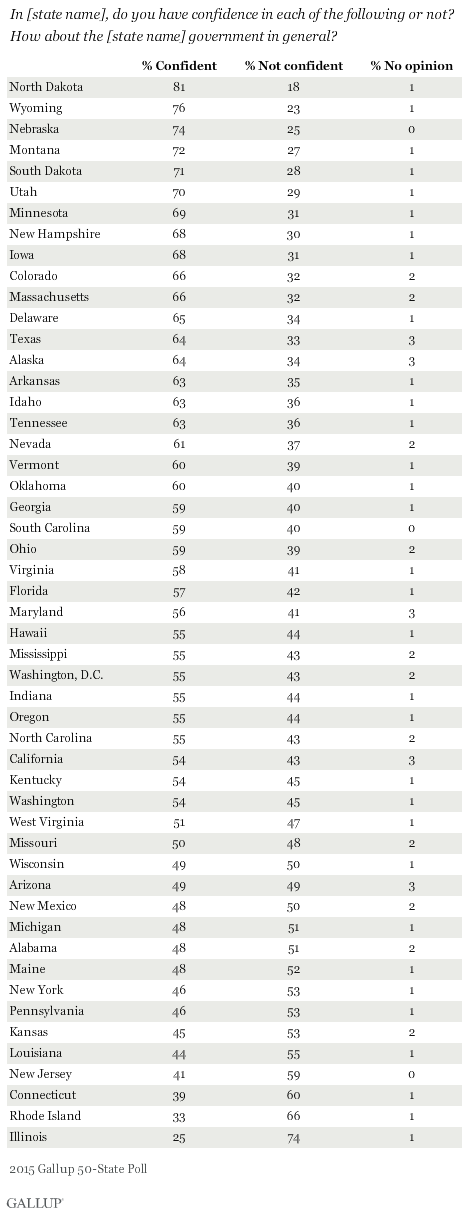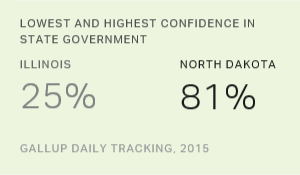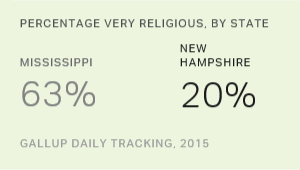Story Highlights
- 25% of Illinois residents confident in state government
- North Dakota residents most confident, at 81%
- Residents in larger states have less confidence, on average
PRINCETON, N.J. -- One in four Illinois residents are confident in their state government, the lowest among the 50 states by a significant margin. Rhode Island (33%) and Connecticut (39%) join Illinois as states with less than 40% government confidence. North Dakota residents are the most trusting; 81% say they are confident in their state government.
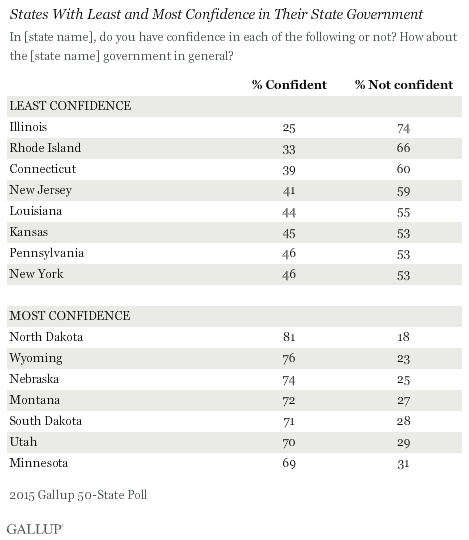
These results are based on Gallup's 50-state poll, conducted March through December 2015. Gallup asked respondents whether they do or do not have confidence in their state's "government in general." The full data for each state appear at the end of this article.
Illinoisans' lack of confidence likely stems from the state's long history of political corruption, with several recent governors having been found guilty of crimes. The state is also in the midst of an eight-month-long impasse over the 2016 state budget between Republican Gov. Bruce Rauner and the Democratic legislature.
Corruption and challenging economic times likely contribute to other states ranking among the least confident in their government. Louisiana, like Illinois, is renowned for corruption in politics, and many of the other lower-confidence states have had high-ranking elected officials convicted of crimes in recent years.
There is a strong positive relationship between residents' ratings of their state's economy and their confidence in state government. In addition to Illinois, Rhode Island, Connecticut, New Jersey and Kansas all rank among the states in which residents are the least positive about their state's economy. North Dakota, Utah, Minnesota and Nebraska are four states in which residents rate their state's economy positively and express high confidence in their state government.
Gallup also conducted a 50-state poll in 2013, which included a question asking respondents how much "trust and confidence" they have in the government of their state to handle "state problems." Despite the differences in question wording between the 2013 and 2015 polls, there is much overlap between the top-ranking states and bottom-ranking states in the two studies. Illinois residents also had the least trust in their state government in 2013, with Rhode Island, Pennsylvania and Louisiana among the lowest as well. North Dakota, Wyoming, Utah and Nebraska ranked among the states with the highest levels of trust in their government in 2013, just as they do in the current study.
State Size a Factor in Government Confidence
Gallup's 2013 analysis of state trust in government found a negative relationship between state population size and trust in government, meaning residents in less populous states tended to have greater confidence in their state government than those living in states that are more populous. That relationship is also apparent in the current data. An average of 64% of residents in the smallest 10 states have confidence in their state government, compared with an average of 51% confidence among residents in the 10 largest states.
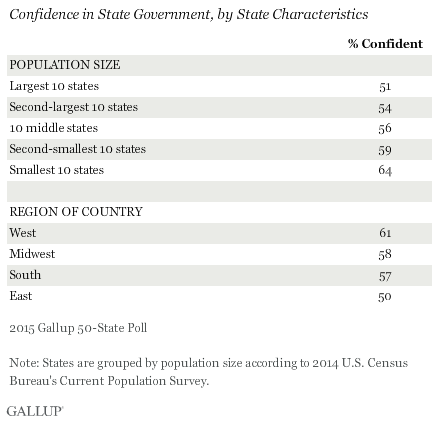
More populous states contain a mix of urban and rural areas and a more diverse population financially, including areas with high concentrations of poverty. Thus, these states likely have greater challenges in delivering needed services to residents than do smaller states, which tend to have more homogeneous populations.
On a regional basis, residents in Western states tend to express the highest confidence in their state governments, largely because no Western states rank among the lowest states while Wyoming, Utah and Montana are among the states with the most confidence in government. The Midwest's average score is held down by Illinois' low level of trust, but the Midwest still ranks second among regions at 58%. The East has the lowest average confidence score, as it is home to five of the states where residents have the lowest confidence in their state government.
Politics Not Strongly Related to Trust
The Illinois budget impasse is an example of the political gridlock that can ensue when states have a governor and legislature of opposing political parties that fail to find common ground on pressing state issues. In general, however, divided party government or unified party government has little relation to confidence in state government. On average, 58% of residents in states in which the same political party controls the governorship and both houses of the state legislature have confidence in their state government, compared with 55% of those in states in which party control of the government is divided.
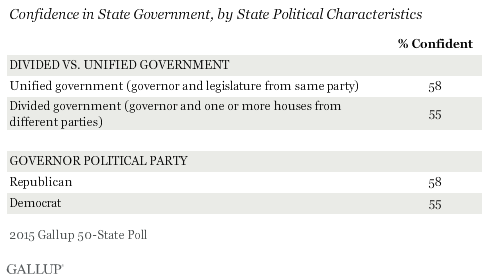
Similarly, there is little difference in confidence in government depending on whether the governor of the state is a Republican or a Democrat. Average confidence is 58% in states led by a Republican chief executive and 55% in states led by a Democrat.
Confidence is higher, on average, in the 22 states that have a Republican governor and GOP majority in both houses of the legislature (60%) than in the seven states that have a Democratic governor and Democratic majority in both houses (52%). The Democratic state average is held down by Rhode Island and Connecticut. Delaware (65%) and Vermont (60%) are two Democratic-controlled states with higher confidence. Many of the Republican-controlled states are less populous states such as Wyoming, Utah, North Dakota and South Dakota.
Implications
In all representative forms of government, residents of a city, state or nation elect officials to conduct business and pass policies on their behalf, for the betterment of all residents. Trust in elected officials is essential to making the system work, but it is severely lacking in many U.S. states.
Given the strong relationship between residents' perceptions of their state's economic health and their confidence in state government, some of the states with less confidence could see that turn around if economic conditions in the state improve. And by the same token, states that have higher trust in their government could see that erode if the state's economy worsens, something that bears watching in energy-producing states like Wyoming and North Dakota, where residents are less optimistic about the direction their economy is headed.
In other states, particularly those with a long history of corruption such as Illinois and Louisiana, there may be cultural or institutional hurdles to overcome, and it may take more than an improving economy to engender confidence in those states' elected officials.
These data are available in Gallup Analytics.
Survey Methods
Results for this Gallup poll are based on telephone interviews conducted March 30-Dec. 22, 2015, with random samples of approximately 500 adults, aged 18 and older, living in each of the 50 U.S. states. Data are weighted to account for unequal selection probability, nonresponse and double coverage of landline and cellphone users in the two sampling frames. Data are also weighted to state estimates of gender, age, race, Hispanic ethnicity, education and phone status (cellphone only, landline only, both, and cellphone mostly).
For results based on the total sample of adults in each state, the margin of sampling error is ±6 percentage points at the 95% confidence level. All reported margins of sampling error include computed design effects for weighting.
Each state sample includes roughly 60% cellphone respondents and 40% landline respondents. Landline and cellular telephone numbers are selected using random-digit-dial methods.
